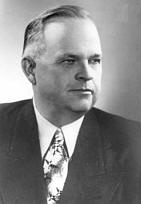| Your
Guide To Oklahoma County Oklahoma Genealogy Part of the OKGenWeb Project | |||
| Updated: 03 Sep 2025 | |||
|
| |||
|
|
Surname Index |
Daily Oklahoman, The Oklahoma City, Oklahoma 1963 From his birth in a log cabin, to a multimillion-dollar
fortune and the title of "uncrowned king of the Senate, Robert
S. Kerr's story could rival the against-all-odds story of
Horatio Alger. "He has climbed farther from such humble real estate than any member of Congress since Lincoln, wrote the Associated Press in 1962, shortly before Kerr's death. "He is today one of the most powerful members of the Senate, and some even call him its uncrowned king. Kerr was born Sept. 11, 1896, in a log cabin near Ada in Indian Territory. His parents, William Samuel and Margaret Kerr, raised a family of seven. Robert Samuel Kerr was the second born and the first son, according to The Oklahoman archives. Kerr was raised on a farm and educated in the public schools of Ada, then a town of fewer than 2,500 people. He attended Oklahoma Baptist University, East Central Teachers College and the University of Oklahoma. Kerr taught school for two years before becoming a magazine salesman for Curtis Publishing Co. in 1916. He then accepted an offer to work in the law office of B.
Robert Elliott of Webb City, Mo. Soon after the United States
entered World War I, Kerr enlisted for officers' training and
was commissioned a second lieutenant and served in a field
artillery unit. Kerr began working in law, in the office of Judge J. F. McKeel of Ada. Kerr passed the bar examination in 1922, became McKeel's partner and began to sharpen the oratorical skills that would serve him in good stead as a politician. But Kerr would again face tragedy when his wife and son died in childbirth in 1924. Kerr was inconsolable and vowed never to remarry, according to the Kerr exhibit at the Carl Albert Center at the University of Oklahoma. Kerr buried himself in his work but found love again. The day
after Christmas in 1925, he married Grayce Breene, the daughter
of a Tulsa oil man. They had four children: Robert Samuel Kerr
Jr., Breene Kerr, Kay Kerr Clark and William Graycen Kerr. While working with McKeel, he became associated with a company engaged in oil well drilling. He became an attorney for Dixon Brothers Drilling Co. in Ada, where his brother-in-law, Jim Anderson, was in charge of drilling. In 1929, he entered an oil partnership with Anderson and
formed Anderson and Kerr Drilling Co. Kerr moved from Ada to
Oklahoma City in 1931 to work full time in the oil business. He accepted the job as Kerr-McGee's chairman of the board of
directors in 1954. Recognizing Kerr's ability to organize, state Democrat Party leaders selected him as national committee chairman in 1940. The allure of politics remained with him, and in 1942, Kerr became the first native-born citizen to serve as Oklahoma governor. "I'm just like you, only I struck oil, was Kerr's campaign
slogan. After he was elected, he took the state from a debt of
$44 million to a surplus of $40 million. During his tenure as U.S. senator, he worked to get the McClellan-Kerr Arkansas River Navigation System developed. Kerr became a published author in 1960 with his book titled
"Land, Wood and Water, which expressed his views on the
importance of conservation of natural resources. He also was
guest editor for a day at the Wichita (Kan.) Beacon, where he
wrote two editorials, "Discriminatory Freight Rates and "The
Industrial Development of Kansas and Oklahoma. Kerr served in the U.S. Senate until his death of a heart
attack Jan. 1, 1963. He was initially buried at his birthplace
near Ada, but in 2006, family members decided to move his
remains to Rose
Hill Burial Park in Oklahoma City. A memorial and his
childhood cabin remain at the Ada site.
Sources: good faith fair use of sources stated above Compiled, transcribed and submitted by Marti Graham, Oklahoma County, OKGenWeb Coordinator, November 2007.
|
|
I hope you enjoy searching through our web site, as I've spent
considerable time on it. If you find other information on the web or elsewhere that might be appropriate for this page, please let me know. I'm am particularly interested journals or other records of movement into Oklahoma County, Oklahoma. | ||
| Site authored by Marti Graham, Coordinator Oklahoma County, Oklahoma part of the OKGenWeb Project |
Visitor: Home Page last updated: Wednesday, 03-Sep-2025 02:38:22 UTC This page updated: 03 Sep 2025 |
|
|
Copyright © 1997-2015. NO PART may be reproduced without author's permission. | ||
|
You found this information at //www.okgenweb.net/~okoklaho/obit/kerr_robert_s.htm | ||

